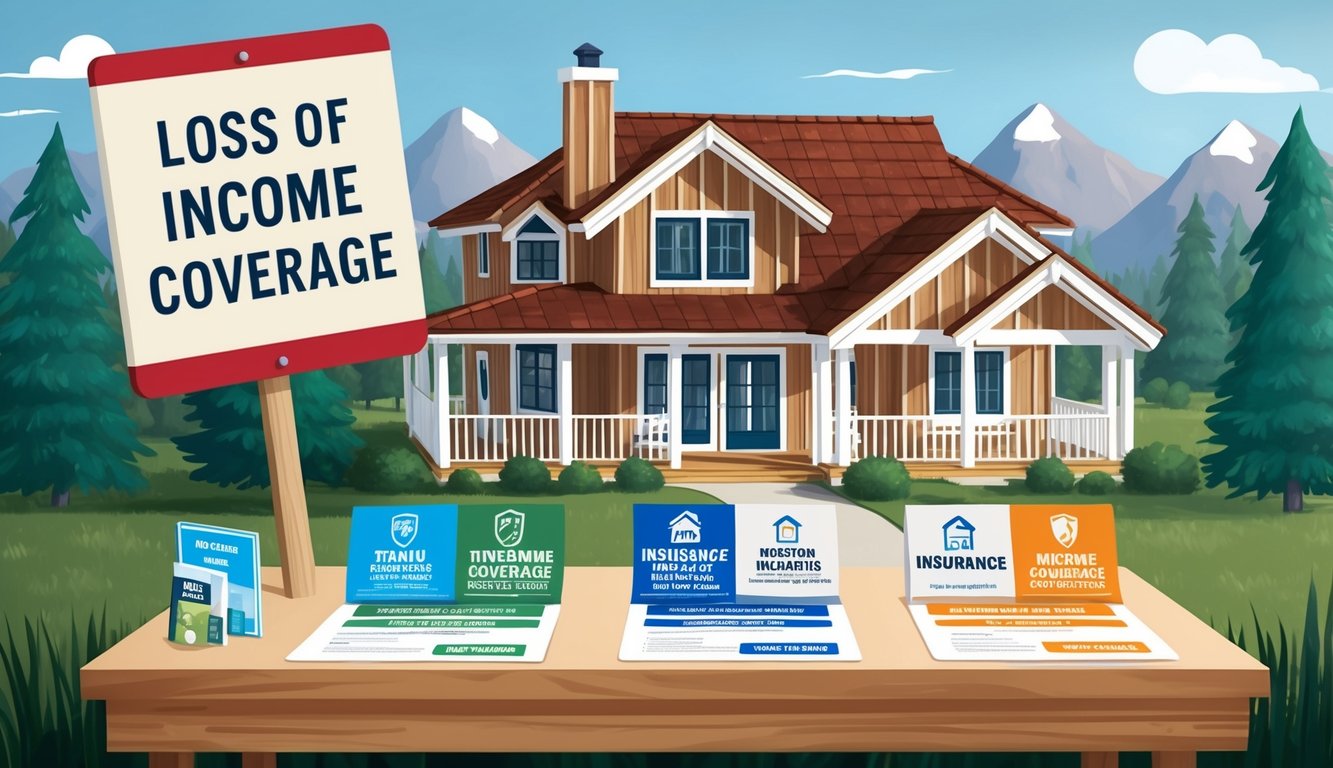Choosing the right insurance for your vacation rental property is a crucial step in protecting your investment and ensuring peace of mind.
The vacation rental market continues to grow, and property owners face unique risks that standard homeowners insurance may not cover adequately.
Vacation rental insurance provides specialized coverage tailored to the specific needs of short-term rental properties, including protection against guest injuries, property damage, and loss of income. By understanding the key factors to consider when selecting insurance, you can make an informed decision that safeguards your property and your financial interests.
1) Evaluate Your Rental Property’s Coverage Needs
When you choose insurance for your vacation rental property, you need to assess your specific coverage requirements.
Start by considering the property’s location and potential risks associated with it.
Coastal properties may need additional flood or hurricane coverage, while mountain cabins might require protection against wildfires or severe winter weather. Evaluate your loss of income coverage needs to ensure you’re protected if your property becomes uninhabitable due to covered perils.
Consider the value of your property and its contents.
This includes the structure itself, any outbuildings, and personal property you provide for guests.
Ensure your coverage limits are sufficient to rebuild or replace these items if necessary.
Liability protection is another critical aspect of vacation rental insurance. Safeguard yourself against potential lawsuits if a guest is injured on your property or their belongings are damaged during their stay.
Don’t forget to account for any unique features of your rental property.
If you have a pool, hot tub, or recreational equipment, you may need additional coverage to protect against associated risks.
Assess whether you need coverage for property damage caused by guests.
Some policies offer protection against accidental or intentional damage by renters, which can be valuable for vacation rentals.
Lastly, consider how often you rent out your property.
If it’s a full-time rental, you’ll need more comprehensive coverage than if it’s only rented occasionally.
Your insurance needs may change if the property is vacant for extended periods.
2) Compare Policies from Different Insurers
When choosing insurance for your vacation rental property, it’s crucial to compare policies from multiple insurers.
Start by obtaining quotes from at least three different insurance companies.
Pay close attention to coverage limits, deductibles, and exclusions.
Each policy may offer different levels of protection for property damage, liability, and loss of income.
Look for insurers that specialize in vacation rental properties.
They often have tailored policies that address the unique risks associated with short-term rentals.
Consider the policy’s coverage for natural disasters common in your area, such as floods, hurricanes, or earthquakes.
Some insurers may offer more comprehensive protection against these risks.
Examine the liability coverage carefully.
Ensure it provides adequate protection against guest injuries and property damage caused by renters.
Check if the policy covers loss of income due to property damage or other covered events that prevent you from renting out your property.
Compare the claims process for each insurer.
Look for companies known for quick and fair claim settlements.
Don’t forget to review customer feedback and ratings for each insurance provider.
This can give you insight into their service quality and reliability.
Consider working with an independent insurance agent who can help you navigate the various options and find the best policy for your specific needs.
Remember that the cheapest option isn’t always the best.
Focus on finding a policy that offers the right balance of coverage and affordability for your vacation rental property.
3) Consider Liability Insurance
Liability insurance is crucial for vacation rental owners.
It protects you from financial losses if a guest is injured on your property or their belongings are damaged during their stay.
This coverage typically includes legal fees and settlement costs if you’re sued.
It can also cover medical expenses for injured guests, regardless of who’s at fault.
Many standard homeowners’ policies don’t provide adequate liability coverage for commercial use. Vacation rental insurance often includes higher liability limits tailored to the unique risks of short-term rentals.
When choosing a policy, consider the potential risks associated with your property.
Do you have a pool, hot tub, or other amenities that could increase the likelihood of accidents?
Look for policies that offer at least $1 million in liability coverage.
Some insurers even provide up to $2 million or more for added protection.
Remember that liability insurance doesn’t just protect your guests.
It also safeguards your personal assets in case of a lawsuit.
Be sure to read the fine print of any policy you’re considering.
Some may have exclusions or limitations that could leave you vulnerable in certain situations.
Vacation rental insurance providers often bundle liability coverage with other essential protections.
This can make it easier to ensure you have comprehensive coverage for your property.
4) Check for Coverage Gaps
When selecting insurance for your vacation rental property, it’s crucial to identify and address any potential coverage gaps.
These gaps can leave you exposed to financial risks if not properly addressed.
Start by carefully reviewing your existing homeowners or landlord insurance policy.
Many standard policies don’t adequately cover short-term rentals, potentially leaving you vulnerable.
Pay close attention to liability coverage.
Ensure your policy includes sufficient protection for guest injuries or property damage that may occur during their stay.
Consider specialized vacation rental insurance that covers unique risks associated with short-term rentals.
These policies often provide more comprehensive protection tailored to your specific needs.
Look for coverage that includes business income protection.
This can help safeguard your rental income if your property becomes uninhabitable due to covered events like natural disasters or accidents.
Don’t forget to examine coverage limits and deductibles.
Make sure they align with your property’s value and your financial situation.
Check if your policy covers damage caused by guests, including theft or intentional acts.
Some policies may exclude these events, creating a significant coverage gap.
Evaluate whether your insurance provides coverage for amenities like pools, hot tubs, or exercise equipment.
These features can increase liability risks and may require additional coverage.
Consider adding umbrella insurance for extra liability protection.
This can provide an additional layer of security beyond your primary policy’s limits.
5) Understand the Claim Process

Familiarizing yourself with the claim process is crucial when choosing vacation rental insurance.
You should know how to file a claim before an incident occurs.
Review your policy’s claim filing procedure.
Most insurance companies offer multiple ways to initiate a claim, including phone, online, or through a mobile app.
Take note of any time limits for filing claims.
Some policies require you to report incidents within a specific timeframe.
Gather necessary documentation for claims.
This may include photos, police reports, or receipts for damaged items. Keeping detailed records can streamline the process.
Understand what information you’ll need to provide when filing a claim.
This typically includes your policy number, details of the incident, and any supporting evidence.
Be aware of the expected timeline for claim processing.
Ask your insurer about average processing times and any factors that might cause delays.
Find out if your policy offers any additional support during the claim process.
Some insurers provide dedicated claim representatives or 24/7 assistance.
Know your responsibilities in mitigating further damage after an incident.
Your policy may require you to take reasonable steps to prevent additional losses.
Ask about the payout process.
Understand how you’ll receive compensation and if there are any deductibles to consider.
6) Assess Deductibles and Premiums

When choosing insurance for your vacation rental property, it’s crucial to evaluate both deductibles and premiums.
These two factors significantly impact your coverage and costs.
A deductible is the amount you pay out of pocket before your insurance kicks in. Higher deductibles generally lead to lower premium payments.
Consider your risk tolerance and financial situation when selecting a deductible.
Premiums are the regular payments you make to maintain your insurance coverage.
Lower premiums often come with higher deductibles or less comprehensive coverage.
To find the right balance, assess your financial cushion.
If you can comfortably handle a larger out-of-pocket expense, opting for a higher deductible can reduce your premium costs.
Consider the value of your vacation rental property and potential risks.
A more valuable property or one in a high-risk area may warrant lower deductibles and higher premiums for better protection.
Review your insurance options carefully.
Compare quotes from different providers to find the best combination of deductibles and premiums for your specific needs.
Remember that the cheapest option isn’t always the best.
Ensure you have adequate coverage to protect your investment while staying within your budget.
7) Seek Discounts for Multiple Policies

When insuring your vacation rental property, explore options for bundling policies to save money.
Many insurance companies offer discounts when you purchase multiple types of coverage from them.
Consider combining your vacation rental insurance with other policies you may need.
This could include homeowners insurance for your primary residence, auto insurance, or umbrella liability coverage.
Ask your insurance agent about multi-policy discounts.
They can help you identify potential savings opportunities by bundling different types of insurance.
Some insurers may offer package deals specifically designed for vacation rental owners.
These packages might include property insurance, liability coverage, and even specialized protection for short-term rentals.
Don’t forget to inquire about loyalty discounts.
If you’ve been with the same insurance company for a while, they might offer additional savings for your continued business.
Compare quotes from multiple insurers to find the best combination of coverage and discounts.
Each company has different bundling options and discount structures, so it’s worth shopping around.
Remember that while discounts are appealing, ensure the bundled policies still provide adequate coverage for your vacation rental property.
Never sacrifice necessary protection solely for the sake of savings.
8) Read Reviews and Ratings

When selecting insurance for your vacation rental property, reading reviews and ratings is crucial.
These provide valuable insights from other property owners who have used the insurance services you’re considering.
Look for reviews on independent websites and forums dedicated to vacation rentals.
These platforms often offer unbiased opinions from real users.
Pay attention to comments about claim processing speed and customer service.
These factors can significantly impact your experience if you ever need to file a claim.
Check the overall rating of the insurance provider.
A high rating usually indicates satisfaction among policyholders.
Be wary of reviews that seem overly positive or negative.
Look for balanced feedback that highlights both pros and cons of the insurance provider.
Consider the relevance of reviews to your specific situation.
Vacation rental insurance needs can vary, so focus on experiences similar to your property type and location.
Don’t neglect to read responses from the insurance companies to negative reviews.
This can give you an idea of how they handle customer concerns.
Remember that while reviews are helpful, they shouldn’t be your only deciding factor.
Use them in conjunction with other research methods to make an informed decision.
If possible, reach out to other vacation rental owners in your area.
They may have personal recommendations based on their experiences with local insurance providers.
9) Consult with an Insurance Broker

When choosing insurance for your vacation rental property, consulting with an insurance broker can be invaluable.
A broker specializes in insurance and can provide expert guidance tailored to your specific needs.
Insurance brokers have access to multiple insurance providers and can compare different policies for you.
This saves you time and effort in researching various options on your own.
They can explain complex insurance terms and coverage details in plain language, helping you understand exactly what you’re getting.
Brokers can also identify potential gaps in coverage that you might overlook.
Your broker will assess the unique risks associated with your vacation rental property.
They’ll consider factors like location, property type, and rental frequency to recommend appropriate coverage levels.
Brokers can often negotiate better rates or customize policies to fit your budget and requirements.
They may have access to specialized vacation rental insurance plans that regular agents might not offer.
Remember, insurance needs can change over time.
A good broker will review your policy periodically and suggest updates as your vacation rental business evolves.
While consulting a broker, be prepared to provide detailed information about your property and rental activities.
This helps ensure you receive the most accurate advice and appropriate coverage options.
10) Inquire About Loss of Income Coverage

When selecting insurance for your vacation rental property, it’s crucial to ask about loss of income coverage.
This type of protection can be invaluable if your property becomes uninhabitable due to covered perils.
Loss of income coverage, also known as fair rental value coverage, helps replace the rental income you would have earned if your property was not damaged.
It can provide financial stability during periods when you’re unable to rent out your vacation home.
You’ll want to ensure you have sufficient coverage to replace rental payments if your guests are forced to relocate temporarily while repairs are being made.
Consider the average nightly or weekly rate for your property when determining the appropriate coverage amount.
Ask your insurance provider about any limitations or exclusions in the loss of income coverage.
Some policies may have restrictions on the duration of coverage or specific events that trigger this protection.
It’s also wise to inquire about how quickly the insurance company typically processes claims for loss of income.
Prompt payouts can help you manage expenses and maintain financial stability during property downtime.
Remember to review and update your coverage periodically, especially if you’ve made improvements to your property or increased your rental rates.
This ensures your loss of income protection remains adequate as your vacation rental business grows.
Understanding Insurance Needs for Vacation Rentals
Vacation rental insurance protects your property and financial interests.
Proper coverage safeguards against potential risks and ensures adequate compensation in case of damages or liability issues.
Assessing Property Risks
Start by evaluating your vacation rental’s unique risks.
Consider factors like location, property type, and guest activities.
Coastal properties may need flood insurance, while mountain cabins might require coverage for winter storm damage.
Identify potential liability issues.
These could include slip-and-fall accidents, food poisoning from kitchen equipment, or injuries from amenities like pools or hot tubs.
Don’t forget to assess risks associated with guest behavior.
Accidental damage, theft, or unauthorized parties can all lead to financial losses.
Determining Coverage Amount
Calculate the total value of your property and its contents.
Include the building structure, furnishings, appliances, and any high-value items.
This forms the basis for your coverage amount.
Consider potential income loss.
If damage renders your property uninhabitable, insurance can compensate for lost rental income.
Estimate your average monthly earnings to determine adequate coverage.
Factor in liability protection.
A minimum of $1 million in liability coverage is often recommended, but higher limits may be necessary depending on your property’s features and location.
Remember to review and adjust your coverage annually.
Property values, rental income, and potential risks can change over time.
Types of Insurance Policies for Vacation Rentals
Vacation rental insurance offers crucial protection for property owners.
Two key types of coverage are essential to safeguard your investment and provide peace of mind.
Liability Coverage
Liability coverage protects you from financial losses if a guest is injured on your property.
This includes medical expenses for injured guests, legal fees if you’re sued, and property damage caused by guests to neighboring properties.
Standard policies typically offer $1 million in liability protection.
Some insurers provide higher limits for additional premiums.
It’s important to note that regular homeowners insurance may not cover commercial activities like vacation rentals.
Specialized vacation rental liability insurance fills this gap.
Consider adding umbrella liability coverage for extra protection.
This can extend your coverage to $2 million or more, depending on your needs and risk tolerance.
Property Damage Coverage
Property damage coverage protects your vacation rental from accidental damage caused by guests, theft of your belongings, natural disasters like floods or earthquakes, and fire damage.
Policy limits vary, so choose coverage that matches your property’s value.
Consider factors like the replacement cost of furnishings and appliances, structural repairs, and loss of rental income during repairs.
Some policies offer additional benefits like emergency repairs coverage, cleaning fees for extensive messes, and vandalism protection.
Review policy details carefully to ensure you’re adequately protected against common vacation rental risks.
Evaluating Insurance Providers
Selecting the right insurance provider for your vacation rental property involves careful comparison of policy options and assessment of company reputation.
These factors will help ensure you get reliable coverage tailored to your specific needs.
Comparing Policy Options
When evaluating insurance providers, start by examining their policy options.
Look for comprehensive coverage that addresses the unique risks of vacation rentals.
Compare deductibles, limits, and exclusions across different plans.
Key areas to consider include:
- Property damage protection
- Liability coverage
- Loss of income protection
- Additional living expenses
Pay attention to specific coverages like accidental damage by guests or protection against theft.
Some policies may offer extras such as coverage for high-value items or emergency travel assistance.
Request quotes from multiple providers to compare pricing.
Be wary of policies that seem too cheap, as they may have significant gaps in coverage.
Checking Provider Reputation
Before making your decision, you must research an insurance provider’s reputation.
Start by checking their financial stability through ratings from agencies like A.M. Best or Standard & Poor’s.
You should also look for customer reviews and testimonials from other vacation rental owners.
Pay attention to feedback about claim handling and customer service experiences.
In addition, consider the provider’s experience in the vacation rental market.
Companies specializing in this niche may offer more tailored coverage and better understand your needs.
Lastly, check if the provider offers 24/7 support, as vacation rental emergencies can happen at any time.
A responsive claims process can make a significant difference in stressful situations.






